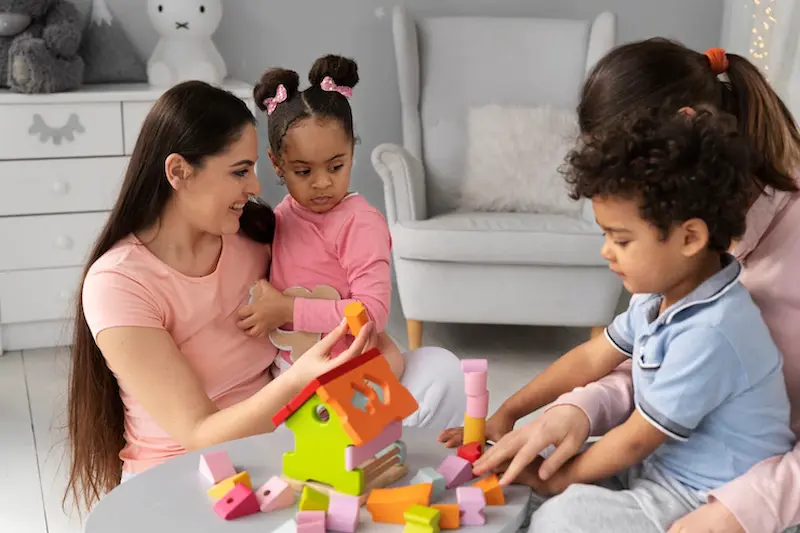How to Get Your Child to Respect You: Parenting can be a challenging journey, filled with ups and downs. One of the most common concerns parents face is how to get their child to respect them. Respect is a fundamental aspect of any healthy parent-child relationship, and it forms the basis for effective communication and cooperation. If you’re struggling to earn your child’s respect, worry not; this guide will provide you with valuable insights and practical tips on how to build a respectful and loving relationship with your child.
1. Be a Role Model


Children often learn by observing the behavior of their parents. If you want your child to respect you, set an example by demonstrating respectful behavior in your interactions with others. Show kindness, patience, and empathy in your daily life, and your child is more likely to mirror these qualities.
Example: If you encounter a difficult situation, handle it calmly and respectfully. Your child will notice your composure and may learn to respond similarly.
2. Communicate Effectively


Open and honest communication is key to any successful relationship. Take the time to listen to your child’s thoughts, feelings, and concerns. Encourage them to express themselves, and validate their emotions. When you communicate with respect, your child is more likely to reciprocate.
Example: If your child comes to you with a problem, listen attentively without interrupting. Offer support and guidance instead of dismissing their concerns.
3. Set Clear Boundaries
Children need structure and clear boundaries to feel safe and secure. Establish age-appropriate rules and expectations, and ensure your child understands them. When rules are consistent and fair, your child will learn to respect them.
Example: If bedtime is at 8 p.m., consistently enforce this rule. Over time, your child will come to respect the routine.
4. Use Positive Reinforcement


Praise and acknowledgment can go a long way in reinforcing positive behavior. When your child behaves respectfully, acknowledge their actions and express your appreciation. This positive reinforcement encourages them to continue respectful behavior.
Example: If your child shares a toy with a friend without prompting, say, “I’m so proud of you for sharing. That was very kind and respectful.”
5. Be Empathetic


Understanding your child’s perspective is crucial for building mutual respect. Put yourself in their shoes and try to see the world from their point of view. This empathy can bridge gaps and strengthen your bond.
Example: If your child is upset about a low grade, empathize by saying, “I understand that you’re disappointed. Let’s work together to figure out how to improve.”
6. Avoid Yelling or Shaming


Respectful communication does not involve yelling, shaming, or belittling your child. These tactics can harm their self-esteem and erode trust. Instead, address behavioral issues calmly and constructively.
Example: Instead of yelling when your child makes a mistake, calmly explain the consequences of their actions and discuss how to make amends.
7. Spend Quality Time Together


Quality time spent with your child strengthens your connection. Engage in activities you both enjoy and create lasting memories. When your child feels valued and loved, they are more likely to respect you.
Example: Dedicate one-on-one time for activities like reading, cooking, or playing sports. Your child will cherish these moments.
8. Encourage Independence
As your child grows, they seek independence. Encourage them to make age-appropriate choices and decisions. Respecting their autonomy fosters a sense of self-worth and respect for your guidance.
Example: Let your child choose their clothing or decide on a weekend activity. Their ability to make decisions will boost their self-esteem.
9. Apologize When Necessary


Parents are not infallible, and there may be times when you make mistakes. When you’re wrong, apologize sincerely. This teaches your child the importance of taking responsibility and admitting when they’re wrong.
Example: If you lose your temper unfairly, apologize by saying, “I’m sorry for raising my voice. I should have handled that differently.”
10. Seek Professional Help When Needed


If you’re facing persistent challenges in building respect and maintaining a healthy parent-child relationship, consider seeking the assistance of a professional family counselor or therapist. They can provide valuable insights and strategies tailored to your specific situation.
In conclusion, earning your child’s respect is an ongoing process that involves modeling, effective communication, and setting clear boundaries. By following these tips and maintaining a loving and respectful approach, you can foster a strong bond with your child built on mutual respect and trust. Remember that each child is unique, so tailor your parenting style to their individual needs and personalities. With patience and consistency, you can create a harmonious and respectful family environment.
| ALSO READ: |
| What Do People Judge You Most On? |
| Exploring the 4 Types of Fitness for a Healthier Lifestyle |
How to Get Your Child to Respect You
FAQ
Q1: What if my child doesn’t listen despite my best efforts to be a role model?
A1: It’s important to remember that children may not always respond immediately to your efforts. Stay patient and consistent in your respectful approach. Sometimes, it takes time for them to internalize these values.
Q2: What if I’ve made mistakes in my parenting that have affected my child’s respect for me?
A2: Nobody is a perfect parent. If you’ve made mistakes, it’s never too late to apologize and work on rebuilding trust. Your willingness to admit errors sets a positive example for your child.
Q3: Can positive reinforcement be overdone?
A3: While praise is important, excessive praise for every small action can lead to a child seeking constant approval. Balance is key. Focus on meaningful and specific praise for truly respectful behavior.
Q4: Is it okay to let my child make choices even if I disagree with them?
A4: Yes, within reasonable limits. Allowing children to make age-appropriate choices fosters independence and respect for their autonomy. However, ensure their choices are safe and within your family’s values.
Q5: When should I consider seeking professional help?
A5: If you find that your efforts to build respect are consistently ineffective or if there are deeper issues affecting your relationship with your child, consulting a professional family counselor or therapist is a good step. They can offer guidance and strategies tailored to your situation.

